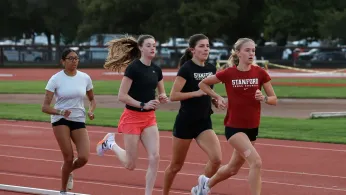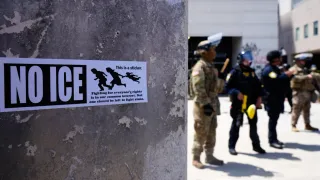
Jun 13
Trump wants to cut funding for California schools over one trans athlete. It's not so easy
Adam Echelman, Calmatters READ TIME: 6 MIN.
Sacramento, CA (CalMatters)
Trump is threatening to withhold funding from California over its policy toward transgender student athletes, but actually doing so could prove tricky for the president.
California's schools and colleges receive billions in federal funding each year -- money that President Donald Trump is threatening to terminate over the actions of one student. AB Hernandez, a junior from Jurupa Valley High School, is transgender, and on May 31 she won first- and second-place medals at the state track and field championship.
"A Biological Male competed in California Girls State Finals, WINNING BIG, despite the fact that they were warned by me not to do so," Trump said in a social media post last week. "As Governor Gavin Newscum (sic) fully understands, large scale fines will be imposed!!!"
Despite this post and a similar threat a few days earlier to withhold "large-scale" federal funding from California, Trump lacks the authority to change the state's policy toward transgender athletes without an act of Congress or a decision by the U.S. Supreme Court. And recent court cases suggest that Trump also may have a hard time withholding money from California.
California state law explicitly allows transgender students in its K-12 school districts to compete on the team that matches their preferred gender, but the Trump administration has issued multiple directives that restrict access to girls' sports, including a letter last week from the U.S. Department of Justice telling high schools to change their policies.
"Let's be clear: sending a letter does not change the law," said State Superintendent of Public Instruction Tony Thurmond in a statement to school districts. "The DOJ's letter to school districts does not announce any new federal law, and state law on this issue has remained unchanged since 2013." On Monday, Thurmond sent a letter directly to the U.S. Justice Department, refuting the Trump administration's legal argument.
California receives over $2 billion each year for its low-income Title I schools, as well as over $1 billion for special education. At the college level, students receive billions in federal financial aid and federal loans. Even if Trump lacks the legal authority to change state law, he could still try to withhold funding from California, just like he tried with Maine. In February, Trump asked Maine Gov. Janet Mills if her state was going to comply with a presidential executive order -- which is not a law -- that directed schools to bar transgender girls from certain sports. Mills said she'd comply with "state and federal laws," effectively rebuking the president.
The Trump administration has since tried to withhold funding from Maine, but legal challenges have prevented it.
Trump made banning transgender youth athletes a centerpiece of his 2024 presidential campaign, and it's remained a focal point for his administration this year. Nationally, Americans increasingly support restrictions on transgender athletes, according to surveys from the Pew Research Center. Gov. Gavin Newsom, who last year signed legislation supporting trans students, spoke out against transgender athletes in a podcast this March, saying it was "deeply unfair" to allow transgender girls to compete in girls' sports.
Female athletes with higher levels of testosterone or with masculine characteristics have long faced scrutiny, biological testing and disqualification. Debates about who gets to participate in girls' or women's sports predate the Trump administration -- and Newsom -- and policies vary depending on the athletic institution.
In 2004, the International Olympic Committee officially allowed transgender athletes to compete in the sport that aligned with their gender identity, as long as the athlete had sex reassignment surgery, only to change that policy in 2015 and require hormone testing. In 2021, the committee changed the policy again, creating more inclusive guidelines but giving local athletic federations the power to create their own eligibility criteria.
Across California, youth leagues, private sports leagues and other independent athletic associations all have their own policies. Some allow transgender women and men to participate; some restrict who can compete. Some require "confirmation" of a participant's gender, such as a government ID or statements from health care professionals, while other associations take the athletes at their word.
California's colleges and universities are not allowed to discriminate against transgender students but state law doesn't provide any guidance beyond that. After the presidential executive order in February, the National Collegiate Athletic Association (NCAA), which independently regulates college sports, changed its rules, prohibiting transgender women from competing and putting colleges in a bind. Roughly 60 California universities are part of the NCAA, including almost all of the UC and many Cal State campuses. Community colleges, which represent the bulk of the state's undergraduates, are not part of the NCAA.
"There's a strong argument (the NCAA rules) could violate state law and federal equal protection," said Elana Redfield, the federal policy director at UCLA's Williams Institute, which studies LGBTQ+ issues.
Amy Bentley-Smith, a spokesperson for the California State University system, declined to comment about how the NCAA policy conflicts with state and federal regulations. She said the Cal State campuses abide by the NCAA rules -- preventing transgender athletes from competing -- while still following state and federal non-discrimination laws regarding trans students.
Stett Holbrook, a spokesperson for the University of California system, said the UC does not have a system-wide policy for transgender athletes. He did not respond to questions about whether the campuses abide by NCAA rules.
Unlike the NCAA, the California Community College Athletic Association allows transgender athletes to compete. A spokesperson for the association, Mike Robles, said he's aware of the NCAA rules and the Trump administration's priorities but he did not say whether the association will modify its own policy.
In February, just days after the president's inauguration and the executive order regarding transgender athletes, the U.S. Department of Education launched an investigation into San Jose State after a women's volleyball player outed her teammate as transgender. The education department has yet to provide an update on that investigation.
With the Trump administration's focus now on CA K-12 school districts, the legal debate has intensified. In its letter to the state's public schools last week, Assistant U.S. Attorney General Harmeet Dhillon said allowing transgender girls to compete in girls' sports is "in violation" of the Equal Protection Clause of the U.S. Constitution and asked schools to change their policies.
But the U.S. Constitution doesn't say anything about transgender athletes, at least not explicitly.
Instead, Dhillon is offering an interpretation of the Constitution, "which doesn't carry the full force of law," Redfield said. The laws that do govern transgender athletes, such Title IX, aren't clear about what schools should do, and the U.S. Supreme Court -- the entity with the power to interpret federal law and the Constitution -- has yet to decide on the matter.
That said, many lower level judges have already weighed in on whether the Constitution or Title IX law protects transgender students or athletes."The preponderance of cases are in favor of trans plaintiffs," Redfield said. "The federal government is contradicting some pretty strong important precedent when they're making these statements."
When CalMatters asked whether California would sue the Trump administration in the event of a funding freeze, a spokesperson for the governor, Brandon Richards, said he could not comment on "hypothetical actions."
Instead, Richards pointed to a recent policy change by the California Interscholastic Federation, the nonprofit entity that regulates high school sports. For the state's track and field championship, the federation said it would implement a new process, whereby AB Hernandez would share her award with any "biological female" that she beat. All "biological female" athletes below Hernandez would also move up in ranking.
On May 31, AB Hernandez shared the first-place podium twice and the second-place podium once, each time with her competitors smiling supportively, the San Francisco Chronicle reported.
Another spokesperson for the governor, Izzy Gardon, said that approach is a "reasonable, respectful way to navigate a complex issue without compromising competitive fairness."
This story is provided as a service of the Institute for Nonprofit News’ On the Ground news wire. The Institute for Nonprofit News (INN) is a network of more than 475 independent, nonprofit newsrooms serving communities throughout the US, Canada, and globally. On the Ground is a service of INN, which aggregates the best of its members’ elections and political content, and provides it free for republication. Read more about INN here: https://inn.org/.
Please coordinate with [email protected] should you want to publish photos for this piece. This content cannot be modified, apart from rewriting the headline. To view the original version, visit: http://calmatters.org/education/k-12-education/2025/06/trans-californi/






